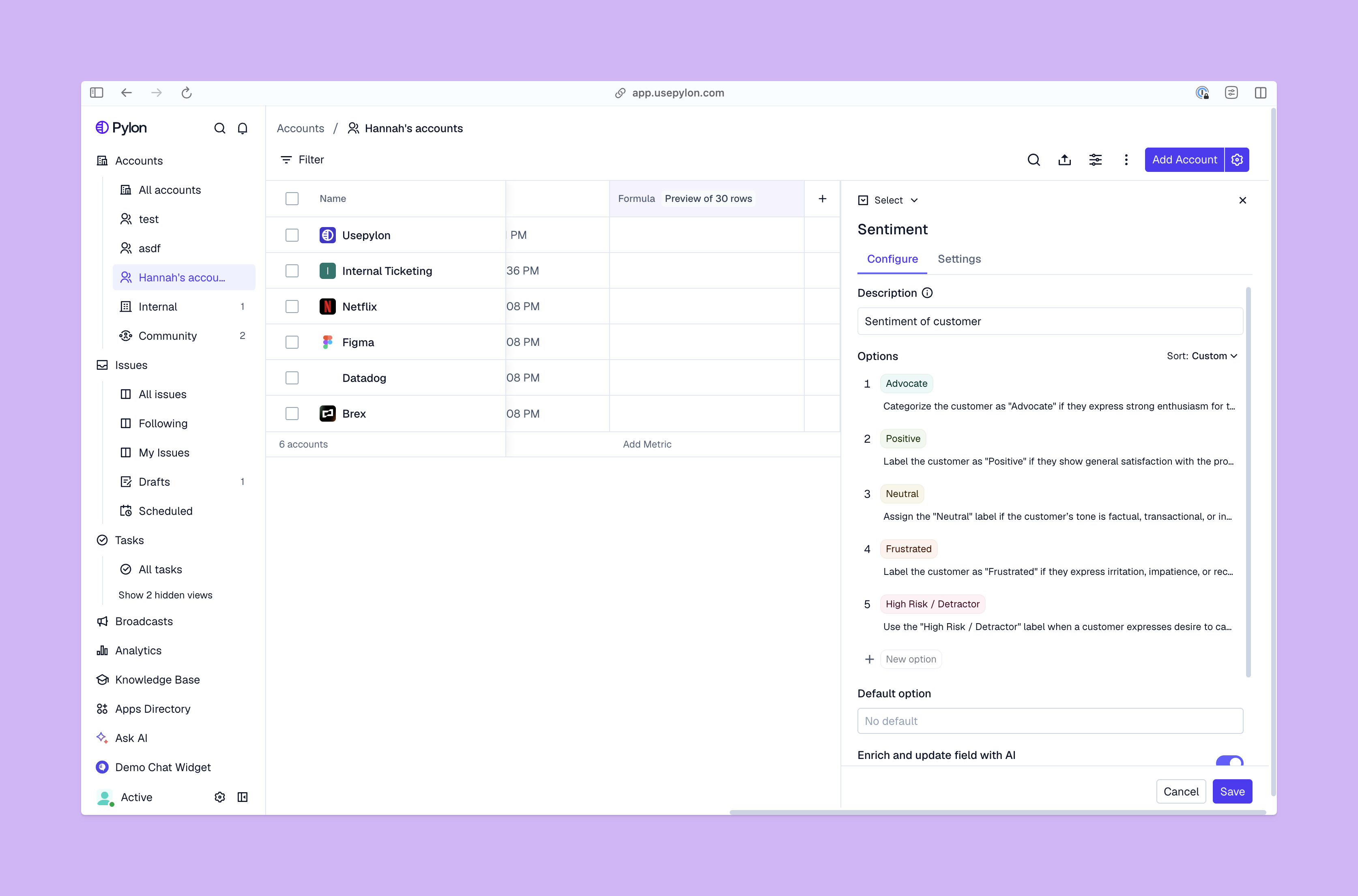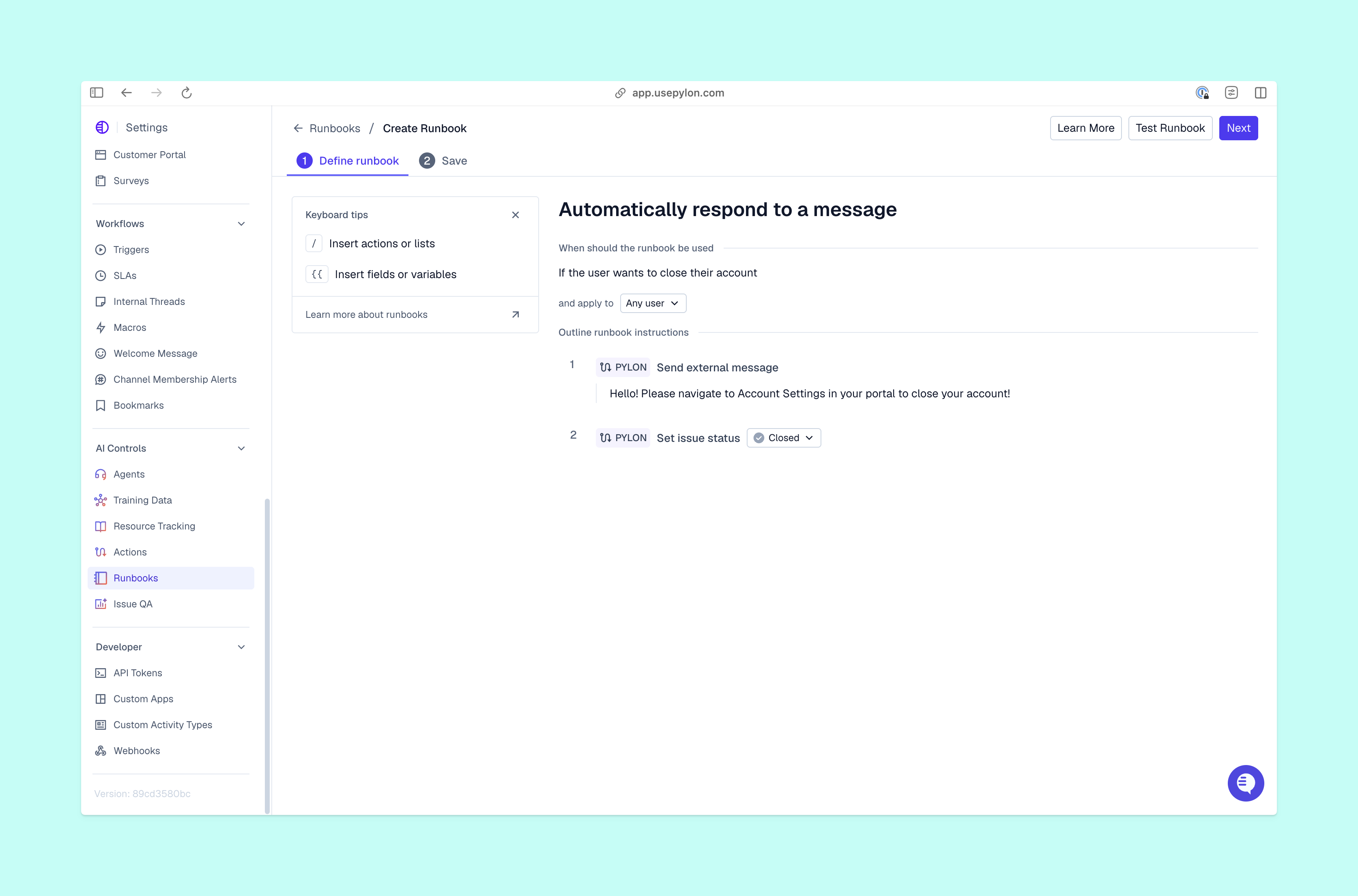The Best B2B Customer Support Platforms in 2025 | A Complete Guide
Modern B2B customer support has evolved beyond email ticketing—your customers expect seamless support through Slack, Microsoft Teams, and the channels where they already work. This comprehensive guide reviews 10 leading platforms, compares their capabilities for handling complex B2B accounts, and provides a practical framework to help you choose the best customer support software for your team's specific needs.
Updated October 24, 2025 | 20 min read
TL;DR
- Modern B2B companies need customer support platforms that go beyond traditional ticketing.
- The best software for B2B client support includes native integrations with Slack and Microsoft Teams, account-centric management, AI automation, and omnichannel capabilities.
- This guide reviews 10 leading platforms, compares their capabilities, and provides selection criteria to help you choose the best B2B customer support platform for your team.
Why B2B Customer Support Tools Are Different (And Why It Matters)
B2B customer support isn't just B2C support on a larger scale. The challenges are fundamentally different.
When you're supporting other businesses, you're managing complex accounts with multiple stakeholders, not individual consumers. A single "customer" might include end users, administrators, and executive decision-makers—each with different needs and expectations.
Traditional help desk software designed for consumer support falls short in several critical areas:
Account complexity: B2B relationships involve ongoing projects, long-term contracts, and multiple touchpoints across an organization. Support platforms need to track all interactions at the account level, not just individual tickets.
Communication channels: Your B2B customers don't work in your support portal. They work in Slack, Microsoft Teams, email, and Discord. Meeting customers where they already work is no longer optional—it's expected.
Technical escalation: B2B support often requires collaboration between your support team, customer success managers (CSMs), and engineering teams. The best B2B customer support platforms facilitate seamless escalation and cross-team collaboration.
Revenue impact: According to Bain & Company research, increasing customer retention rates by just 5% can boost profits by 25-95%. In B2B, where customer lifetime values are substantially higher, support quality directly impacts the bottom line.
The platforms covered in this guide address these B2B-specific challenges with features that are purpose-built for business customers.
The Evolution of B2B Customer Support Software in 2025
Recently the B2B customer support landscape has been going through a dramatic transformation. Three major shifts are redefining what "best-in-class" means:
1. The Rise of Business Messaging Channels
Email-only support is no longer sufficient. McKinsey's 2024 B2B Pulse research shows B2B customers now use an average of 10+ touchpoints across their buying and support journey.
Modern B2B support platforms must integrate natively with:
- Slack Connect for external collaboration
- Microsoft Teams for enterprise communication
- Discord for developer communities
- Traditional channels like email and in-app chat
Platforms that treat business messaging as an afterthought create friction. The best solutions provide omnichannel support where conversations flow seamlessly across channels.
2. AI-Powered Automation That Actually Works
AI in customer support has moved beyond hype to deliver measurable results. HubSpot's 2024 State of Service Report reveals that 92% of CRM leaders report AI has improved response times, with 77% believing AI will handle most tickets by 2025.
The best AI-powered customer support platforms now offer:
- Intelligent triage and routing based on urgency and account value
- AI-assisted response drafting using your knowledge base
- Automated status updates and follow-ups
- Conversation summarization for faster support team ramp-up
- Predictive analytics for proactive issue resolution
3. Account-Centric Support Models
Traditional ticketing systems treat each support request in isolation. B2B support requires an account-centric approach where every interaction, ticket, and conversation is tied back to the customer account.
This shift enables:
- Complete visibility into account health and history
- Prioritization based on account value and contract terms
- Coordinated support across multiple stakeholders
- Integration with customer success workflows
Pylon's Account Intelligence can identify at-risk accounts before churn occurs and proactively address emerging issues.
Key Features of the Best B2B Customer Support Platforms
When evaluating customer support software for B2B teams, prioritize platforms that offer:
Native Business Messaging Integration
Support should flow naturally within Slack Connect, Microsoft Teams, and Discord—not require customers to context-switch to a separate portal. Look for platforms with two-way sync that brings conversations into your support platform while keeping customers in their preferred environment.
Account Management Capabilities
The platform should organize support data by account, not just by individual user. This includes tracking multiple contacts, managing SLAs at the account level, and providing visibility into account health metrics.
AI and Automation
Modern AI capabilities go beyond simple chatbots. The best platforms offer intelligent routing, response drafting, automated triage, and predictive analytics that reduce manual work while maintaining quality.
Developer-Friendly APIs
Technical B2B companies need deep integrations with engineering tools like GitHub, Linear, and Jira. Look for platforms with robust APIs that enable custom workflows and data syncing.
Cross-Team Collaboration
B2B support often requires input from customer success, product, and engineering teams. Internal collaboration features like private notes, assignment workflows, and escalation paths are essential.
Comprehensive Reporting
Beyond basic ticket metrics, you need analytics that show account health, CSAT trends, first response time by channel, resolution rates, and support's impact on retention and revenue.
Security and Compliance
B2B customers expect SOC 2 Type II compliance, GDPR compliance, data residency options, and robust access controls. Security isn't optional.
The 10 Best B2B Customer Support Platforms for 2025
We've evaluated dozens of platforms based on their B2B capabilities, customer reviews, integration depth, and real-world performance. Here are the top 10 platforms that excel at serving B2B companies.
1. Pylon – Best for Modern B2B Teams

G2 rating: 4.8/5
Starting price: See pricing page
Best for: B2B companies who want omnichannel support, AI agents & assistants, AI knowledge management, and account context for proactive customer success all in one platform.
Pylon is the modern B2B support platform that offers true omnichannel support across Slack, Teams, email, chat, ticket forms, and more. Our AI Agents & Assistants automate busywork and reduce response times. Plus, with Account Intelligence that unifies scattered customer signals to calculate health scores and identify churn risk, we're built for customer success at scale.
Why B2B teams choose Pylon:
The platform excels at Slack customer support and Teams integration, providing native two-way sync that keeps conversations flowing naturally. Customers can raise issues, track resolution progress, and communicate with your team entirely within Slack or Teams—no portal logins required.
Pylon's conversational ticketing model recognizes that B2B support is rarely a simple "question and answer." Complex issues require back-and-forth dialogue, escalations, and collaboration. The platform maintains context across these multi-threaded conversations while organizing them into manageable tickets.
AI Agents and Assistants provide intelligent response suggestions, automatic triage, and conversation summarization to help your support team scale their operations.
Account Intelligence means your team sees complete customer history, ongoing issues, and account health at a glance. This visibility enables prioritization based on account value and contract terms, not just ticket volume.
Key features:
- Native Slack, Teams, and Discord support with full conversation sync
- Conversational ticketing that maintains context across multi-threaded discussions
- AI-powered triage, routing, and response assistance
- Account-centric organization with complete customer visibility
- Knowledge base software with AI-powered article suggestions
- Advanced analytics and custom reporting
- Developer-friendly API for custom integrations
- Omnichannel support across messaging, email, and in-app chat
Considerations:
- New platform with growing integrations
- Best if you have a conversational support approach
Ideal for:
- B2B SaaS companies
- Support teams that need to scale fast
- Teams that need robust, customizable AI agents
- Companies that need AI tools for knowledge management
- Companies whose customers prefer Slack or Teams communication
2. Zendesk – Best for Traditional Support Teams
G2 rating: 4.3/5
Starting price: $25-$150+ per agent/month
Best for: Large enterprises with complex, high-volume support operations
Zendesk is a traditional choice for B2B support. It offers some customization capabilities for your support ops and a wide ecosystem of integrations.
Why enterprises choose Zendesk:
Zendesk Sunshine™ provides a customizable CRM layer that technical teams can extend with custom applications. This flexibility makes Zendesk adaptable to different B2B support workflows.
Key features:
- Customization and workflow automation
- Reporting and analytics with custom dashboards
- Integration marketplace with 1,000+ apps
- Enterprise security and compliance certifications
Considerations:
- Complex onboarding requires dedicated IT resources
- Pricing scales rapidly with advanced features
- Slack and Teams integrations exist but aren’t native
- Can be overwhelming for smaller B2B teams
If you're evaluating alternatives, see our comparison of 14 best Zendesk alternatives and Zendesk alternatives for 2025.
Ideal for:
- Traditional enterprises
- Organizations with dedicated IT support teams.
3. Intercom – Best for Product-Led Companies
G2 rating: 4.5/5
Starting price: Custom pricing (scales with usage)
Best for: Product-led growth companies that prioritize in-app engagement
Intercom leads with in-app messaging, making it ideal for companies that want to blend support with product engagement.
Why product-led companies choose Intercom:
Fin 2, Intercom's AI agent, handles conversations with contextual awareness of user behavior, subscription status, and product usage. It can resolve common issues while escalating complex problems to support teams.
The platform focuses on proactive messaging—sending onboarding tips, feature announcements, and contextual help based on user behavior. This blurs the line between support and product adoption.
In-app messenger integration means customers never leave your product to get help. This means customers don’t need to navigate to a separate support portal.
Key features:
- Conversational AI (Fin 2)
- In-app messaging and product tours
- Behavioral targeting and segmentation
- Proactive messaging campaigns
- Multi-channel support (chat, email, social)
- Team collaboration features
Considerations:
- Pricing can escalate quickly based on volume
- Slack and Teams support is secondary to in-app chat
- Account-level organization is less robust than specialized B2B platforms
- Companies need to provide significant product usage data
Ideal for:
- Companies prioritizing in-app support experiences
4. HubSpot Service Hub – Best for Integrated B2B Lifecycle
G2 rating: 4.4/5
Starting price: Free tier available; paid plans from $9-$100+/user/month
Best for: Teams using HubSpot's CRM ecosystem
HubSpot Service Hub shines when your organization already uses HubSpot for sales and marketing.
Why HubSpot users choose Service Hub:
The platform's integration with HubSpot CRM means your team can see sales interactions, marketing touchpoints, and support tickets in one view.
Customer feedback tools and satisfaction surveys integrate with your support workflow, enabling continuous improvement based on real customer data.
The conversation inbox unifies email, live chat, and forms into a single interface where support teams can manage customer communications.
Key features:
- Seamless CRM integration with sales and marketing data
- Unified conversation inbox
- Ticketing system with automation
- Knowledge base and customer self-service portal
- Customer feedback and survey tools
- Reporting across the entire customer lifecycle
- Free tier for small teams
Considerations:
- Business messaging integration (Slack/Teams) is limited
- Best value comes if you’re already using the full HubSpot ecosystem
- Advanced features require higher-tier plans
- AI capabilities less sophisticated than specialized support platforms
Ideal for:
- B2B companies already using HubSpot
- Teams that want unified sales/marketing/support data
- Organizations that prioritize lifecycle visibility
5. Freshdesk – Best for Multi-Channel B2B Support
G2 rating: 4.4/5
Starting price: Free plan available; paid plans from $15-$79/agent/month
Best for: Growing companies that need multi-channel support
Freshdesk offers good value for mid-market companies. The platform balances comprehensive features with affordable pricing.
Why growing companies choose Freshdesk:
Freddy AI provides intelligent automation for ticket categorization, response suggestions, and routing. While it’s not as advanced as specialized AI platforms, it delivers meaningful efficiency gains at a fraction of the cost.
The multi-channel inbox consolidates email, phone, chat, social media, and web forms. This unified view enables teams to manage customer communications without tool-switching.
Team collaboration features like shared ownership, private notes, and collision detection prevent duplicate responses and enable smooth handoffs.
Key features:
- Multi-channel support (email, phone, chat, social)
- Freddy AI for automation and insights
- Free plan for up to 10 users
- Team collaboration and collision detection
- SLA management and escalations
- Custom ticket views and workflows
- Marketplace with 650+ integrations
Considerations:
- Slack and Teams integration less robust than native-first platforms
- Account-centric features limited compared to specialized B2B tools
- Advanced AI capabilities require higher-tier plans
Ideal for:
- Mid-market companies
- Teams with limited budgets
6. Front – Best for Email-Centric Relationships
G2 rating: 4.7/5
Starting price: $19-$79+ per seat/month
Best for: Teams that manage customer relationships primarily through email
Front transforms email into a collaborative team experience. For companies where email remains the primary support channel, Front offers solid capabilities.
Why email-heavy teams choose Front:
The shared inbox approach gives teams complete visibility into customer communications while maintaining individual accountability. Multiple team members can collaborate on complex responses without confusing the customer.
Personal and shared email address support means your team can respond from team inboxes or their individual addresses, depending on the relationship context.
Comment threads enable internal collaboration on customer emails without cluttering the actual email thread. Teams can discuss strategy, tag subject matter experts, and coordinate responses privately.
Key features:
- Shared inbox with individual accountability
- Personal and team email integration
- Internal comment threads for collaboration
- Customer context and history sidebar
- Automated routing and assignment rules
- Analytics on team performance and response times
- Integration with 90+ business tools
Considerations:
- Email-first design; other channels are secondary
- Limited native Slack/Teams support functionality
- Account organization less sophisticated than B2B-specific platforms
Ideal for:
- Agencies
- Consultancies
- Teams where email is the main customer communication channel
7. Help Scout – Best Value for Small Teams
G2 rating: 4.4/5
Starting price: $20-$65 per user/month (free trial available)
Best for: Small to mid-size teams that need affordable pricing
Help Scout delivers good value by combining intuitive design and transparent pricing. It's common among bootstrapped and early-stage companies.
Why budget-conscious teams choose Help Scout:
The platform's simplicity reduces training time. New team members become productive quickly without extensive onboarding, which lowers the total cost of ownership.
Docs, Help Scout's knowledge base product, integrates with the ticketing system. Teams can link to relevant articles while customers can self-serve before creating tickets.
Customer properties enable basic account management without the complexity of enterprise platforms. Teams can track account tier, subscription status, and other customer context.
Key features:
- Minimal learning curve
- Shared inbox with assignment and collision detection
- Integrated knowledge base (Docs)
- Saved replies and workflows for efficiency
- Customer properties for account context
- Basic reporting and analytics
- Mobile apps for iOS and Android
Considerations:
- Limited business messaging integration
- AI features less advanced than competitors
- Account management capabilities basic compared to enterprise tools
- Good for smaller teams and simpler workflows
Ideal for:
- Small teams
- Bootstrapped companies
- Organizations that prioritize ease of use over advanced features
8. Gorgias – Best for B2B Ecommerce
G2 rating: 4.6/5
Starting price: $10-$900+ per month (based on ticket volume)
Best for: B2B companies selling through ecommerce channels
Gorgias was built specifically for ecommerce, making it a good choice for B2B wholesalers, distributors, and manufacturers.
Why B2B ecommerce companies choose Gorgias:
Deep integrations with Shopify, WooCommerce, Magento, and BigCommerce provide order visibility within support conversations. Teams can view order history, process refunds, and update shipping without leaving the ticket.
Automated workflows for common ecommerce scenarios—order status inquiries, return requests, shipping delays—reduce response time and support teams’ workload.
Revenue attribution tracking shows which support interactions lead to sales, helping B2B teams understand support's direct contribution to revenue.
Key features:
- Deep ecommerce platform integrations
- Order management within tickets
- Automated responses for common ecommerce scenarios
- Revenue attribution and sales impact tracking
- Multi-channel support (email, chat, social, SMS)
- Shopify partnership and specialized features
- Self-service customer portal
Considerations:
- Optimized specifically for ecommerce use cases
- Less suitable for B2B SaaS or service companies
- Pricing based on ticket volume can become expensive
- Account management features focused on individual buyers, not complex B2B accounts
Ideal for:
- B2B wholesalers
- Distributors
- Manufacturers with ecommerce channels
9. Salesforce Service Cloud – Best for CRM-Integrated Support
G2 rating: 4.4/5
Starting price: $25-$300+ per user/month
Best for: Traditional companies already using the Salesforce ecosystem
For organizations that are deeply invested in Salesforce, Service Cloud provides integration with sales, marketing, and operational data.
Why Salesforce customers choose Service Cloud:
The platform shares the same underlying data model as Sales Cloud, Marketing Cloud, and other Salesforce products.
Einstein AI for Service delivers predictive case routing, next-best-action recommendations, and automated case classification.
Field service capabilities extend support beyond digital channels to include on-site service, equipment maintenance, and work order management—important for B2B companies with physical products.
Key Features:
- Salesforce ecosystem integration
- Unified customer data across sales, marketing, and service
- Einstein AI for predictive analytics and automation
- Omnichannel routing and management
- Field service management capabilities
- Extensive customization via Salesforce platform
- Enterprise-grade security and compliance
Considerations:
- Significant implementation and customization investment required
- Expensive, especially at enterprise tiers
- Complex platform requiring Salesforce expertise
- Overkill for companies not using broader Salesforce ecosystem
Ideal for:
- Traditional enterprises
- B2B organizations that mainly use Salesforce CRM
- Companies that need integrated field service capabilities
10. Kustomer – Best for Conversational CRM
G2 rating: 4.3/5
Starting price: Custom pricing
Best for: Companies prioritizing relationship management over support ticketing
Kustomer reimagines support software as a conversational CRM, organizing information around customer relationships rather than tickets.
Why companies choose Kustomer:
The timeline view shows customer interactions chronologically—tickets, chats, calls, transactions, and custom events.
Proactive support campaigns enable outreach before problems occur. You can message customers about upcoming renewals, feature releases, or potential issues based on triggers and customer data.
Key Features:
- Customer-centric data model (not ticket-centric)
- Omnichannel messaging (email, chat, SMS, voice, social)
- Timeline view of customer history
- Proactive outreach campaigns
- Advanced workflow automation
- AI chatbots and routing
Considerations:
- Implementation requires careful data modeling
- Business messaging integration secondary to owned channels
- Better for companies who are prioritizing relationship management
Ideal for:
- High-touch support models
Platform Comparison: At-a-Glance
How to Choose the Right B2B Customer Support Platform

Selecting customer support software is a significant decision that impacts team productivity, customer satisfaction, and ultimately revenue retention. Follow this framework to identify the best platform for your specific needs.
Step 1: Assess Your Communication Channel Strategy
Where do your B2B customers prefer to communicate? If they mostly live in Slack or Teams, or you need omnichannel capabilities, prioritize platforms with native business messaging support like Pylon.
According to research, B2B customers now expect support across 10+ touchpoints. The best B2B customer support platforms meet customers on their preferred channels rather than forcing them into a separate portal. Review our guide on practical omnichannel support for implementation strategies.
Step 2: Evaluate Account Complexity
How complex are your B2B customer relationships? If you have multiple stakeholders per account, choose platforms with strong account management like Pylon.
Other considerations:
- Enterprise contracts with SLAs: Look for robust SLA management and escalation features
- High-touch relationships: Prioritize platforms that integrate with customer success workflows
Step 3: Determine AI and Automation Requirements
What level of automation do you need?
AI-powered customer support delivers measurable ROI, but the right level of automation varies by team:
- Intelligent routing and triage: Pylon or Kustomer
- Response assistance for agents: Most modern platforms offer AI-drafted responses
- Minimal automation: Help Scout provides basic automation without AI complexity
Step 4: Consider Integration Requirements
What tools must your support platform integrate with?
- Engineering tools: Platforms with Linear and Jira integrations like Pylon
- Business intelligence: Consider data warehouse integration capabilities
- Internal tools: Ensure compatibility with your existing tech stack
Step 5: Calculate Total Cost of Ownership
Look beyond monthly per-seat pricing:
- Implementation time: Legacy platforms like Zendesk and Salesforce require months; modern platforms like Pylon or Help Scout can deploy in days
- Training requirements: Complex systems increase onboarding costs
- Integration development: Custom API work adds expense
- Support contract costs: Factor in professional services and support tier expenses
Forrester research shows modern customer service platforms deliver 315% ROI over three years with less than 6-month payback periods, but only when properly implemented and adopted.
Step 6: Test with Real Scenarios
Most platforms offer trials or demos. Before committing, test these B2B-specific scenarios:
- Multi-stakeholder tickets: Create a support issue involving multiple contacts at the same account
- Cross-channel conversation: Start an issue in Slack/Teams and continue via the platform
- Technical escalation: Practice escalating to engineering with context handoff
- Account health review: Pull reports showing account-level support metrics
- Integration workflow: Test critical integrations with your existing tools
Step 7: Evaluate Security and Compliance
B2B customers expect enterprise-grade security:
- SOC 2 Type II certification (minimum requirement)
- GDPR compliance for European customers
- HIPAA compliance if handling health data
- Data residency options for regulated industries
- Role-based access controls and audit logs
Review security documentation before shortlisting platforms. See Pylon's security page as an example of compliance transparency.
Industry Research: The ROI of Modern B2B Support Platforms
Understanding the business impact helps justify investment in best-in-class support software.
Retention Impact
Bain & Company research demonstrates that increasing customer retention rates by just 5% can boost profits by 25-95%, with exact percentages varying by industry. In B2B contexts with high customer lifetime values, retention improvements deliver outsized returns.
McKinsey research shows experience-led growth companies achieve 5-10% revenue gains within two years. Superior support experiences directly contribute to this growth.
Cost Efficiency
Gartner analysis reveals significant cost variations by channel:
- Support team-assisted interactions: $8 average cost
- Self-service interactions: $0.10 average cost
Modern platforms with strong knowledge base capabilities enable self-service deflection, reducing cost per resolution while improving customer satisfaction.
Revenue Attribution
Salesforce's 2024 State of Service Report reveals 91% of organizations now track service-driven revenue, up from 51% in 2018. The best B2B customer support platforms provide revenue attribution capabilities that demonstrate support's contribution to expansion and renewal revenue.
Response Time Improvements
HubSpot's 2024 State of Service Report shows 92% of CRM leaders report AI has improved response times. Platforms with intelligent automation enable faster responses without proportional headcount increases.
Implementation ROI
Forrester's Total Economic Impact study demonstrates modern customer service platforms deliver:
- 315% ROI over three years
- Less than 6-month payback periods
- 25-45% reduction in support operations costs
Implementing Your Chosen B2B Support Platform
After selecting a platform, successful implementation requires careful planning.
Phase 1: Foundation (Weeks 1-2)
- Configure core settings and user accounts
- Set up team structure and routing rules
- Import customer data and historical tickets (if migrating)
- Configure primary communication channels
- Create initial knowledge base content
Phase 2: Integration (Weeks 3-4)
- Connect CRM and business intelligence tools
- Set up engineering tool integrations (Linear, Jira, etc.)
- Configure single sign-on (SSO)
- Test critical workflow automations
- Establish data sync schedules
Phase 3: Training and Adoption (Weeks 5-6)
- Train support team on platform features
- Document internal processes and best practices
- Run parallel operations with existing system (if applicable)
- Gather team feedback and adjust workflows
- Begin gradual customer migration to new channels
Phase 4: Optimization (Ongoing)
- Monitor key metrics and identify improvement areas
- Expand automation based on ticket patterns
- Build out knowledge base based on common issues
- Refine routing rules and SLA configurations
- Regular team training on new features
For platforms like Slack for customer support, adoption happens naturally since customers already use these tools daily. Traditional platforms require more change management to drive adoption.
Common B2B Customer Support Platform Mistakes to Avoid
Mistake 1: Prioritizing Features Over User Experience
The most feature-rich platform isn't always the best choice. If your team finds the software frustrating to use, they'll develop workarounds that undermine your investment.
Solution: Prioritize intuitive interfaces and conduct thorough usability testing during evaluation.
Mistake 2: Ignoring Business Messaging Integration
Email-only support increasingly frustrates B2B customers who expect to communicate via Slack, Teams, or other business messaging platforms where they already spend their day.
Solution: Evaluate how naturally the platform integrates with business messaging channels. Platforms with native integrations like Pylon deliver better experiences than notification-only approaches. See our guide on Slack integrations for customer support.
Mistake 3: Underestimating Implementation Complexity
Legacy platforms like Zendesk and Salesforce can take months to implement properly. This delay impacts customer satisfaction and team morale.
Solution: Be realistic about implementation timelines and resource requirements. Consider modern alternatives that deploy in days rather than months.
Mistake 4: Choosing Based on Brand Recognition Alone
Well-known platforms aren't always the best fit for B2B companies. Many were designed for B2C support and retrofitted for business customers.
Solution: Evaluate platforms based on B2B-specific capabilities: account management, business messaging, and technical escalation workflows.
Mistake 5: Neglecting Account-Level Organization
Traditional ticket-centric systems create visibility gaps when multiple stakeholders from the same account submit issues.
Solution: Choose platforms with account-centric data models that aggregate all interactions by customer account, not just by individual user.
Mistake 6: Over-Relying on AI Without Human Oversight
While AI delivers efficiency gains, B2B customers often require nuanced, relationship-aware support that pure automation can't provide.
Solution: Select platforms where AI boosts your team (like Pylon's AI assistants) instead of attempting to replace them.
Future Trends in B2B Customer Support Software
The B2B support landscape continues evolving rapidly. Here are key trends shaping the future:
Conversational Support Becomes Default
Traditional ticket numbers and support portals are fading. Modern platforms enable natural, conversational interactions that maintain context across channels and time. This shift mirrors how B2B professionals communicate internally and expect to interact with vendors.
AI Agents Handle Routine Work End-to-End
Beyond simple chatbots, sophisticated AI agents now handle complete workflows—from initial triage through resolution and follow-up. Support teams increasingly focus on complex issues requiring judgment and relationship management.
Proactive Support Replaces Reactive Responses
Platforms with account intelligence capabilities like Pylon identify issues before customers report them. Proactive outreach about potential problems, upcoming renewals, or product changes becomes standard practice.
Knowledge Management Evolves with AI
Static knowledge bases are giving way to intelligent AI knowledge management systems that:
- Automatically generate articles from resolved tickets
- Surface relevant information contextually during conversations
- Identify knowledge gaps based on common questions
- Maintain accuracy through continuous learning
Integration Depth Over Breadth
Rather than offering hundreds of shallow integrations, leading platforms provide deep, bi-directional sync with critical business tools. This enables true workflow automation rather than simple data passing.
Frequently Asked Questions
What is the best software for B2B client support?
The best software for B2B client support depends on your specific needs, but top contenders include Pylon for modern teams prioritizing conversational support and an all-in-one tool, Zendesk for traditional enterprise operations, and Intercom for product-led companies. The optimal choice depends on factors like customer communication preferences, account complexity, team size, and integration requirements.
What are the best B2B customer support platforms in 2025?
The leading B2B customer support platforms in 2025 are: Pylon (for modern conversational support and an all-in-one support platform), Zendesk (for traditional enterprises), Intercom (for in-app support), HubSpot Service Hub (for ecosystem integration), Freshdesk (for multi-channel value), Front (for email-centric teams), Help Scout (for small teams), Salesforce Service Cloud (for CRM integration), and Kustomer (for relationship-focused support).
Which company has the best customer support tools?
No single company has "the best" customer support tools for all scenarios. The "best" depends on your specific requirements: communication channels, account complexity, team size, budget, and integration needs.
How much does B2B customer support software typically cost?
B2B customer support software pricing varies significantly. Entry-level options like Help Scout and Freshdesk start around $15-25 per user monthly, with free tiers available. Platforms like Front and Pylon typically cost $20-80 per user. Enterprise solutions like Zendesk range from $25-150+ per user depending on features. Platforms like Intercom and Salesforce use custom pricing based on usage. Consider total cost of ownership including implementation, training, and integrations when budgeting.
What's the difference between B2B and B2C customer support software?
B2B customer support software differs fundamentally from B2C tools. B2B platforms must handle account-level organization (multiple stakeholders per customer), longer relationship cycles, technical escalation workflows, integration with business messaging (Slack, Teams), SLA management for contract compliance, and revenue attribution tracking. B2C tools focus on high-volume ticket processing, consumer channels (SMS, social media), and individual user relationships. Using B2C tools for B2B creates visibility gaps and workflow friction.
Do I need native Slack or Microsoft Teams integration for B2B support?
Native business messaging integration is increasingly essential for B2B companies. If your customers use Slack, Microsoft Teams, or Discord for daily work, they expect to receive support through those channels without context-switching. Native integration means full conversation sync and seamless workflows—not just notifications. Platforms like Pylon were built specifically for these channels, while legacy tools offer basic notification-only integration. Consider your customers' communication preferences when evaluating platforms.
How important is AI in modern B2B customer support platforms?
AI delivers measurable value in modern B2B support platforms. Research shows 92% of CRM leaders report AI has improved response times, with 77% believing AI will handle most tickets by 2025. Key AI capabilities include intelligent triage and routing, response drafting assistance, conversation summarization, and predictive analytics for account health. However, B2B support still requires human judgment for complex issues. Choose platforms where AI augments support teams rather than attempting complete automation.
What are the must-have features for B2B customer support software?
Essential B2B customer support features include: account-centric organization (grouping all contacts and tickets by customer account), omnichannel support across business messaging and traditional channels, intelligent routing and SLA management, cross-team collaboration tools, knowledge base for self-service, comprehensive analytics showing account health, API for custom integrations, and enterprise security (SOC 2, GDPR). Prioritize platforms purpose-built for B2B rather than consumer tools retrofitted for business use.
How long does it take to implement B2B customer support software?
Implementation timelines vary dramatically by platform. Modern platforms like Pylon, Help Scout, and Freshdesk can be operational in days to weeks with minimal resources. Mid-complexity solutions like Intercom and HubSpot typically require weeks to months for setup and integration. Legacy platforms like Zendesk and Salesforce often need several months and dedicated IT resources for full implementation. Factor in data migration, integration development, training, and adoption when planning timelines.
Can I migrate from my current support platform without disrupting service?
Yes, with proper planning. Most B2B customer support platforms provide migration tools for importing historical tickets, customer data, and knowledge base content. Best practice is to run parallel operations during transition, gradually moving customers to the new platform. Modern platforms with API-first architectures like Pylon make migration simpler. Plan for 4-8 weeks of transition depending on data volume and integration complexity. Consider working with the new vendor's implementation team for smooth migrations.
How do I measure ROI from B2B customer support software?
Measure ROI through multiple metrics: customer retention rate (5% improvement can boost profits 25-95% according to Bain research), average response and resolution times, customer satisfaction scores (CSAT/NPS), support ticket volume trends (deflection through self-service), cost per ticket (Gartner shows agent interactions cost $8 vs $0.10 for self-service), and support-driven revenue attribution. Forrester research demonstrates modern platforms deliver 315% ROI over three years with under 6-month payback. Track metrics before and after implementation to quantify impact.
What security certifications should B2B customer support platforms have?
B2B customer support platforms should have SOC 2 Type II certification (minimum requirement for enterprise customers), GDPR compliance for European Union data protection, HIPAA compliance if handling health information, and adherence to ISO 27001 information security standards. Additionally, look for penetration testing reports, data residency options for regulated industries, role-based access controls, audit logging, and SSO/SAML support. Review each vendor's security documentation and certifications before shortlisting platforms.
Conclusion: Choosing the Best B2B Customer Support Platform for Your Team
The B2B customer support landscape has fundamentally evolved. Email-only ticketing systems designed for consumer support no longer meet the needs of modern business customers who expect seamless communication across Slack, Teams, email, and in-app channels.
The best software for B2B client support in 2025 shares several characteristics:
- Native business messaging integration that meets customers where they work
- Account-centric organization providing complete relationship visibility
- Intelligent automation that augments support teams without replacing them
- Seamless integrations with CRM, engineering tools, and business intelligence platforms
- Enterprise security meeting SOC 2, GDPR, and industry-specific compliance requirements
The platforms reviewed in this guide represent the best B2B customer support platforms available in 2025. Each excels in different scenarios based on your communication channel strategy, account complexity, team size, and integration requirements.
Most importantly, remember that the best platform is the one your team will actually use consistently to deliver exceptional customer experiences. Features matter less than adoption, and adoption depends on choosing software that aligns with how your team and customers naturally communicate.
Ready to modernize your B2B customer support? Pylon is the modern B2B support platform that offers true omnichannel support across Slack, Teams, email, chat, ticket forms, and more. Our AI Agents & Assistants automate busywork and reduce response times. Plus, with Account Intelligence that unifies scattered customer signals to calculate health scores and identify churn risk, we're built for customer success at scale.










